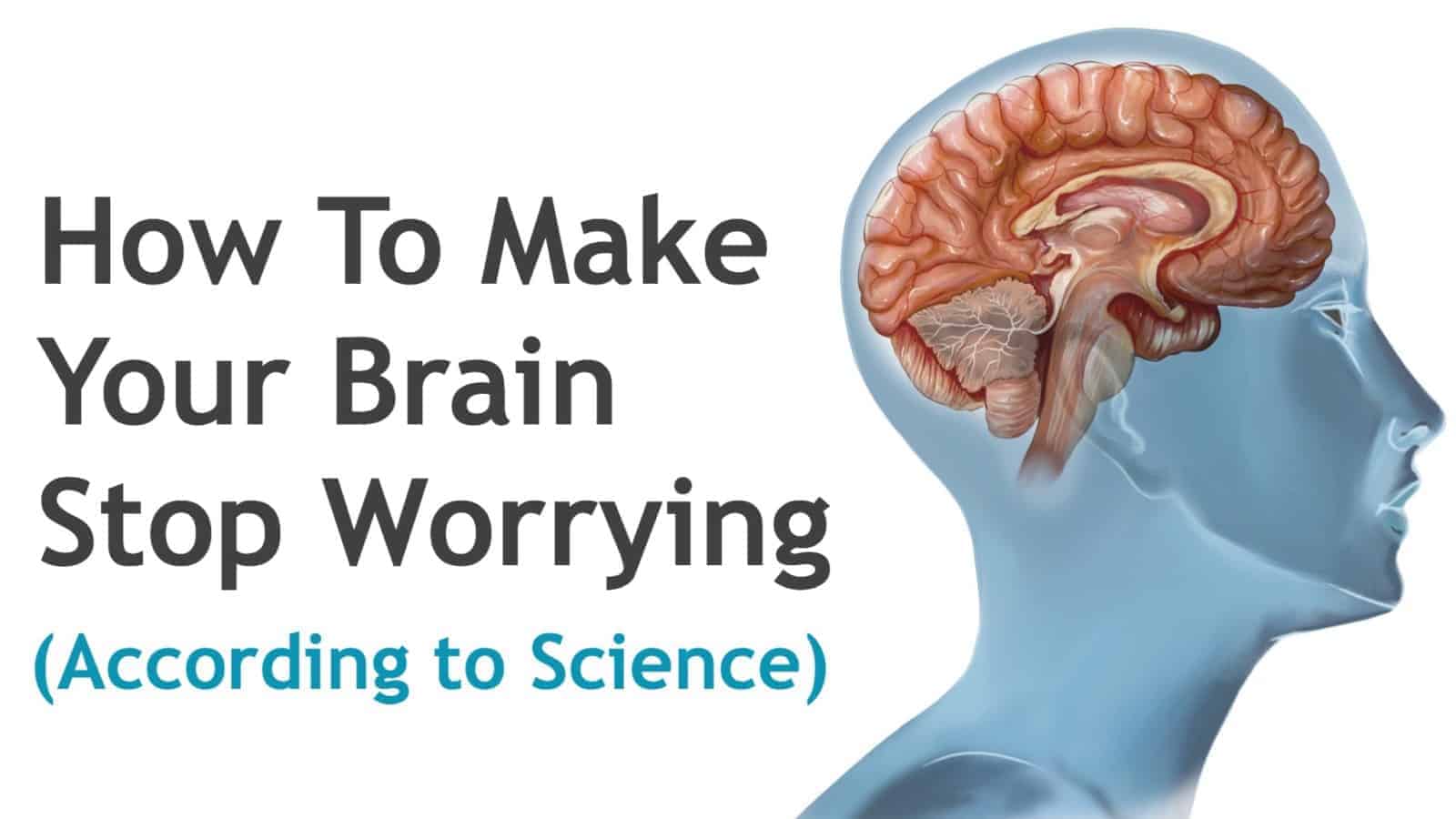Did you know that we have ‘two’ brains? We may have one structurally, but cognitively, we have two. There’s the “thinking” brain and the “non-thinking” brain. Our brains are wired to worry first and think second.
New York University (NYU) brain scientist Joseph LeDoux sums it up nicely: “connections from the emotional systems to the cognitive (thinking) systems are stronger than connections from the cognitive systems to the emotional systems.”
The system that Dr. LeDoux is talking about is the limbic system, which is a set of structures deep within the breath that evokes an emotional response. The limbic system, which includes the hippocampus and amygdala, is the oldest within the brain.
The thinking part of our brain, the prefrontal cortex (PFC), is the newest. This helps explain why, though we’re intelligent creatures, we sometimes make dumb decisions. Maybe we’ll buy something on “sale” out of fear the sale will expire, or we’ll reach for a pint of Ben and Jerry’s, though we need to “weigh-in” the morning after.
The worrying brain will overrule the thinking brain every time if we don’t know to override it.
And make no mistake, it is essential to know how to overrule the worrying brain.
We’re overwhelmed by stimulation because of the fast-paced, 24/7, “always-on” society designed for us. Whether positive or negative, stimulation activates the brain’s fight-or-flight (FoF) response.
Overstimulation plus overwhelm equals terrible decisions. Remember this formula: (Os + Ow = Bd).
According to the National Institute of Mental Health, over 18 percent of American adults suffer from anxiety disorders, characterized as excessive worry or tension that often leads to other physical symptoms. ~ California Institute of Technology
Overriding the Limbic System
Suppose you could see inside your brain when your eyes meet some object of your delight (shoes, clothes, a handsome man, a beautiful woman). In that case, you’d see massive electrical activity firing from the limbic system to your cortex.
Your emotional brain is telling your thinking brain what to do.
There’s some good (excellent!) news and some bad news. The good news is that you can override your limbic system’s tendency to let emotions control your life. The bad news is that it takes time and effort.
But if you’re willing to invest that time and effort, you’ll reap some incredible rewards.
As an incentive, please take out a piece of paper and pen (I’ll do the same, I promise!)
Write down three benefits you can think of if emotions didn’t control your life. Take two to three minutes. Please don’t move on until you’ve written down these three benefits – it’s essential to the rest of this article.
For example, you could jot down these desired outcomes:
- Be less stressed
- Save more money
- Be more productive
Keep this list somewhere you can see it! It’ll serve as a great motivator when things get tough.
How To Stop Worrying So Much
We aim to reverse the brain’s default pathway from the limbic system to the cortex. To get your brain’s cortex telling the limbic system what to do!
We will discuss five steps that will help you control the worrying brain if studied and regularly practiced. It helps to keep a journal, as these steps require delving into your thoughts. Writing your thoughts on paper will do two things: (1) help you remember the five steps, and (2) provide context to fleeting thoughts.
Susan Krauss Whitbourne, Ph.D., Professor Emerita of Psychological and Brain Sciences at the University of Massachusetts Amherst, gives us a “five-step playbook” for successfully overriding the limbic system:
1. Examine your irrational beliefs.
We often have illogical beliefs that lead us to see threats where no threat exists. These beliefs involve our need to live up to life’s “musts.” Find a realistic balance between your ideal and your actual self, and your worries will retreat.
2. Learn how to talk your way through your feelings.
In cognitive-behavioral therapy, clients learn to counter their illogical thoughts with more clear-headed evaluation. Much of this process involves substituting people’s negative ways with more neutral or positive thoughts.
3. Set your feelings aside when you make crucial decisions.
Emotional arguments easily sway us. Trial lawyers do a successful business by appealing to jurors’ emotions, hoping they will let their sympathy for the victim outweigh their judgments about legal liability. No human will ever be utterly dispassionate in such situations, but the more you separate logic from emotion, the more likely you’ll make fair and reasoned choices.
4. Get support from someone who can help you.
Our emotions react quickly and forcefully to specific experiences and try as we might, we can’t rein in those feelings. This is why sponsors are so crucial to programs such as Alcoholics Anonymous. That other person can serve as your “cortex” when your own is heavily influenced by an addiction that is ruling your limbic system.
5. Build confidence in your self-control.
According to the notion of self-efficacy, people can gain control over their problematic behaviors when they see themselves as able to exert that control. As you gain strength from good decisions, from conquering your worries or controlling your impulses, you gradually find that those impulses and fears dominate you less and less.
How to Stop Worrying So Much
Now that you recognize these traits, how do you fix this issue? Take a look at these tips.
1. Only focus on the things you can control.
Many of our problems in life stem from our attitudes about situations rather than reality itself. The more we try to control other people or events, the less happy we will feel. So, it’s crucial for your mental health to only focus on managing your behaviors, thoughts, and emotions.
After all, there’s nothing else in this world that you have power over but yourself. Try your best and leave the rest up to fate, karma, or whatever you want.
There’s only so much we can do in this lifetime. You have done your part as long as you’re a kind-hearted person who compassionately treats yourself and others.
2. Simplify your life to avoid worrying.
Minimalism has become very popular because it makes life simpler and saves money in the long run. Accumulating material things makes no sense anyway because we can’t take them. Advertisements appeal to our emotions and make us believe we need the latest gadget, food, or beauty product to feel special.
However, once you buy something, you still don’t feel satisfied. That’s because nothing outside ourselves can ever make us feel complete.
So, more people have turned to minimalism to reduce expenses, worries, and complexities of life. Remember, we’re spiritual beings having a human experience, so material items can never bring lasting fulfillment. Only realizing your true nature can, and that’s discovered within yourself.
3. Help others.
Worrying tends to dissipate when we focus more on others instead of ourselves. Studies show that people who volunteer, for instance, have greater satisfaction and well-being. The study examined data from nearly 70,000 UK participants who answered surveys about their volunteering habits and well-being. They filled out surveys every two years from 1996 to 2014.
Compared to those who didn’t volunteer, people who had volunteered within the past year had improved mental health. The effect was especially pronounced for people who frequently volunteered (at least once per month).
We’re all in this together, and miracles happen when we break down the walls we’ve built and reconnect. We remember that we’re all humans just trying to understand life, and we get farther by helping each other.
4. Live in the moment.
Where else can you live, after all? The past is behind you, and the future hasn’t happened yet. So dwelling on either leads to poor mental health. Live in the here and now, and watch the beauty of life unfold all around you. Rooting yourself in the present opens yourself to more significant opportunities and happiness. So, avoid worrying about life by simply being here and taking it all in. You can’t control everything around you but have power over your reactions.
5. Practice meditation or mindfulness to quell worrying.
We mention meditation quite often in our articles, but it’s for a good reason. Not only does meditation lower stress and anxiety, but it also improves physical health. It reduces heart rate, high blood pressure, and the risk of heart disease and strokes. While the primary goal of any spiritual practice is to reach the highest state of consciousness, it’s also an excellent tool for lowering daily stress.
Even corporations have recommended meditation to employees because of its proven benefits on well-being, productivity, and concentration. Mindfulness isn’t difficult to practice; it’s simply about learning to separate your ego from your true self. As you meditate more often, your awareness increases, watching your thoughts rather than becoming attached to them.
6. Eat a healthy diet.
Our food affects every cell in our bodies, either healing us or contributing to disease, depending on our choices. Processed foods deplete the body and mind of oxygen, making us feel lethargic, depressed, and anxious. Whole, fresh foods give us life, as we’ve evolved to eat only from nature.
Our bodies don’t recognize modern lab-created foods, so if you want to feel mentally sharp, try to eat healthy, clean foods. Fruits, vegetables, nuts, seeds, grains, tofu, and low-fat dairy fall under this category. Also, olive oil or avocado oil is healthy in moderation, providing omega-3 fats for brain health.
Finally, caffeine has been implicated in increasing anxiety, so it’s best to avoid coffee and energy drinks if they affect you negatively.
7. Get your body moving.
Worrying happens when you have pent-up anxiety or tension that isn’t released. With the advent of modern desk jobs, it’s no wonder why we have an anxiety and depression epidemic. Our ancient minds and bodies still require regular movement to maintain optimal health. So, if you feel anxious or stressed, go for a jog or any other form of exercise that gets your heart pumping.
8. Avoid overusing technology.
We’ve centered our lives around technology nowadays but forget that it isn’t the point of life. Specific technologies such as medical advancements, GPS, and computers have improved society exponentially.
However, in particular, smartphones have been quite detrimental due to their constant stimulation—much of our worrying stems from scrolling endlessly on social media or reading the news too often.
If you want to reduce your stress, one of the best things you can do is avoid or limit your technology use. Remember that it’s a tool, not something to use when you feel bored or escape reality.

Final Thoughts on Finding Ways to Stop Worrying
In today’s world, stress and worries have reached an all-time high. The ever-increasing complexity of modern life makes it challenging to remain focused, calm, and optimistic. However, even if things seem hopeless, we can still control our worrying through mindfulness, healthy living, and minimalism. We can’t govern the world, but we can regain our power by managing ourselves.
After all, the man who conquers himself possesses greater power than thousands of men in battle. So, remember your inner strength and don’t let the world affect you so much. You’re the universe expressing itself as a human being, so you have more power than you think.



















